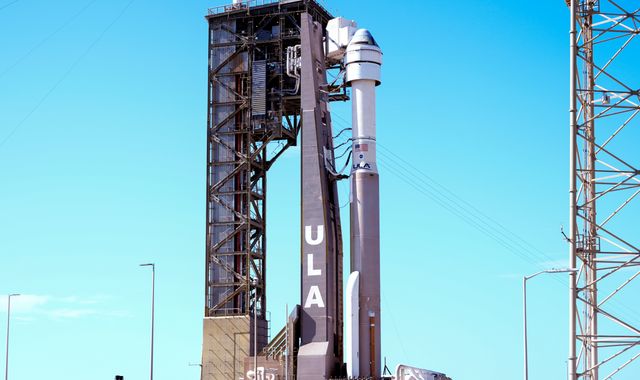Boeing delays first ever astronaut launch due to valve problem
7 May 2024, 05:40 | Updated: 7 May 2024, 07:58

Boeing has called off its first-ever astronaut launch at the final moment after discovering a valve problem in the Atlas V rocket.
The two NASA test pilots had just strapped into Boeing's Starliner capsule at Cape Canaveral space station for a flight to the International Space Station on Monday night (US EST) when the countdown stopped - two hours before the planned lift-off.
It was the latest delay for Boeing's first crew flight, on hold for years because of capsule trouble.
The Atlas V rocket is manufactured by the United Launch Alliance, which includes Boeing and Lockheed Martin.
United Launch Alliance's chief executive Tory Bruno said the most recent delay may have been caused by an oxygen pressure-relief valve on the upper stage of the rocket that started fluttering open and closed, creating a loud buzz.
The valve may have exceeded its 200,000 lifetime cycles which means it will have to be replaced, pushing the launch into next week, Mr Bruno said.
In an update, NASA said the launch will take place no earlier than Friday.
Mr Bruno said similar valve issues had occurred in previous years on other Atlas rockets launching satellites and these were resolved by turning the valves off and back on.
But the company has stricter flight rules for astronaut flights, prohibiting valve recycling when a crew is on board.
"And so we stayed with the rules and the procedures, and scrubbed as a result," Mr Bruno said at a news conference.
It meant the two-member crew of NASA astronauts Barry "Butch" Wilmore, 61, and Sunita "Suni" Williams, 58, had to be removed from the capsule by technicians, before they were whisked away from the launch complex to await a second flight attempt when the issue is resolved.
NASA's commercial crew programme manager Steve Stich added: "We're taking it one step at a time, and we're going to launch when we're ready and fly when it's safe to do so."
Starliner's first test flight without a crew failed to reach the space station in 2019 and Boeing had to repeat the flight. The company then encountered parachute issues and flammable tape.
NASA hired Boeing and SpaceX a decade ago to ferry astronauts to and from the space station after the shuttle programme ended, paying the private companies billions of dollars.
Atlas V has been in operation for more than 20 years after it was designed by Lockheed Martin.
(c) Sky News 2024: Boeing delays first ever astronaut launch due to valve problem

























